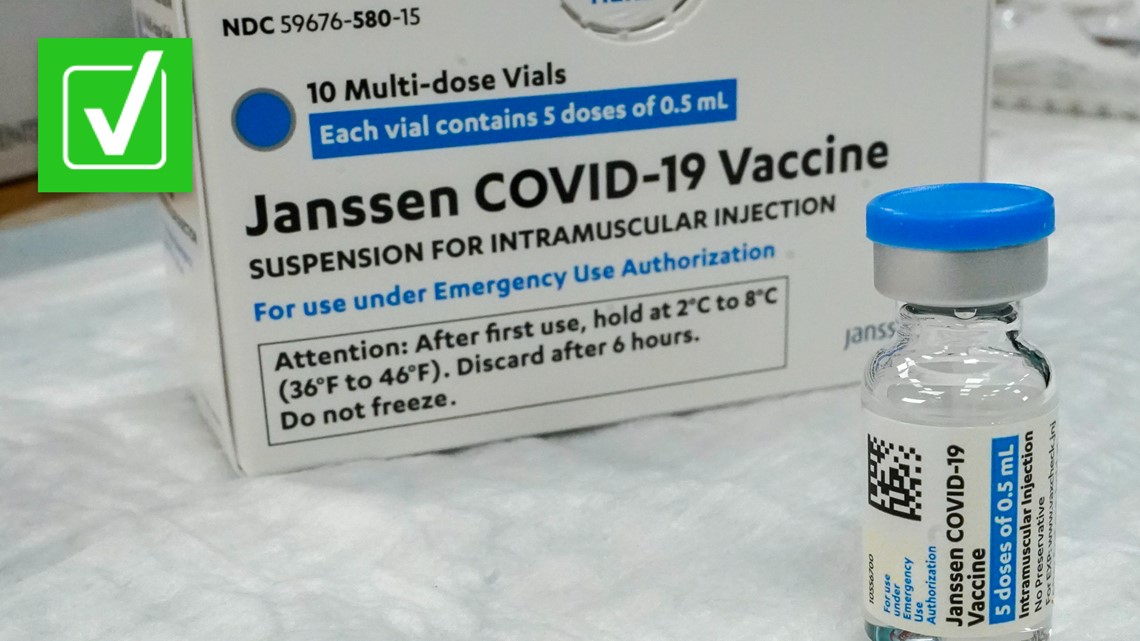Adults who received a Johnson & Johnson COVID-19 vaccine at least two months ago are eligible for a booster shot of either J&J, Moderna or Pfizer.
On Oct. 20, the U.S. Food and Drug Administration (FDA) updated its emergency use authorizations to make all three authorized COVID-19 vaccines available as booster shots for people who meet eligibility requirements. A day later, on Oct. 21, the Centers for Disease Control and Prevention (CDC) issued a recommendation that aligned with the FDA’s updated guidance.
In the days since the updated guidelines, VERIFY has received a wide range of questions from viewers about booster shot eligibility. Many of the questions have focused specifically on people who initially received the one-shot Johnson & Johnson COVID-19 vaccine.
THE QUESTION
Are most Johnson & Johnson COVID-19 vaccine recipients now eligible for a booster shot?
THE SOURCES
THE ANSWER
Yes, U.S. regulators now recommend adults who received the Johnson & Johnson COVID-19 vaccine at least two months ago get a booster shot. People who got the Johnson & Johnson COVID-19 vaccine less than two months ago need to wait until they meet that threshold.
People at least two months removed from receiving the Johnson & Johnson vaccine can get any of the three authorized COVID-19 vaccines, Johnson & Johnson, Pfizer or Moderna, for a booster shot.
WHAT WE FOUND
The FDA and CDC’s latest COVID-19 vaccine guidance included a booster recommendation for Johnson & Johnson vaccine recipients.
“For the nearly 15 million people who got the Johnson & Johnson COVID-19 vaccine, booster shots are also recommended for those who are 18 and older and who were vaccinated two or more months ago,” the CDC said in an Oct. 21 statement.
It’s the first time U.S. regulators have made a booster recommendation for Johnson & Johnson COVID-19 vaccine recipients.
Data from the CDC shows more than 15 million total Johnson & Johnson COVID-19 vaccine doses have been administered in the U.S. as of Oct. 24, but that’s far less than 154 million Moderna doses and 243 million Pfizer doses that have been administered (although the Pfizer and Moderna primary vaccine series includes two doses).
The rollout of the Johnson & Johnson vaccine was disrupted in the spring when the FDA and CDC recommended a temporary pause due to reports of people having a rare blood clot, called thrombosis with thrombocytopenia syndrome (TTS), after receiving the vaccine. The pause was lifted after 10 days. As of Oct. 13, the CDC said more than 15.2 million doses of the Johnson & Johnson vaccine had been administered and there were 47 confirmed reports of people, mostly women younger than 50, getting the vaccine and later developing TTS.
A real-world study by the CDC of U.S. adults without immunocompromising conditions found the initial Johnson & Johnson vaccine dose was 71% effective against COVID-19 hospitalization.
In September, Johnson & Johnson said its study showed a booster dose given 56 days after the first shot provided 94% protection against moderate to severe/critical COVID-19 in the U.S. The company said antibody levels rose four to six times higher than seen after the initial shot.
Days before making the booster shot recommendation, the FDA said it reviewed a study that indicated a booster Johnson & Johnson COVID-19 vaccine dose “substantially increases efficacy, especially against symptomatic infections, including when caused by SARS-CoV-2 variants of concern.”
In addition to the Johnson & Johnson booster recommendation, the CDC and FDA also OK’d “mixing and matching” authorized COVID-19 vaccines for booster shots. That means people who received a Johnson & Johnson COVID-19 vaccine at least two months ago can get another Johnson & Johnson shot as a booster, or get a booster shot of the Moderna or Pfizer COVID-19 vaccines.
The mix-and-match recommendation was made following a federal clinical trial that hasn’t yet been peer-reviewed, in which researchers concluded that mixing and matching booster doses of the Johnson & Johnson, Pfizer and Moderna COVID-19 vaccines was safe and led to a rise in antibodies.
In the study, Johnson & Johnson COVID-19 vaccine recipients had a greater increase in antibody levels 15 days after a booster dose of the Moderna or Pfizer vaccines than with another Johnson & Johnson dose. However, the study notes, “the sample size is insufficient for inter-group comparisons, and the demographics of those studied are not representative of the U.S.”
Dr. Anthony Fauci, director of the National Institute of Allergy and Infectious Diseases, said during an Oct. 22 press briefing the bottom-line takeaway from the study was that mixing and matching booster shots led to an increase in antibodies.
More from VERIFY: Yes, you can now ‘mix and match’ the COVID-19 vaccine booster shots in the US
Follow Us
Want something VERIFIED?













































